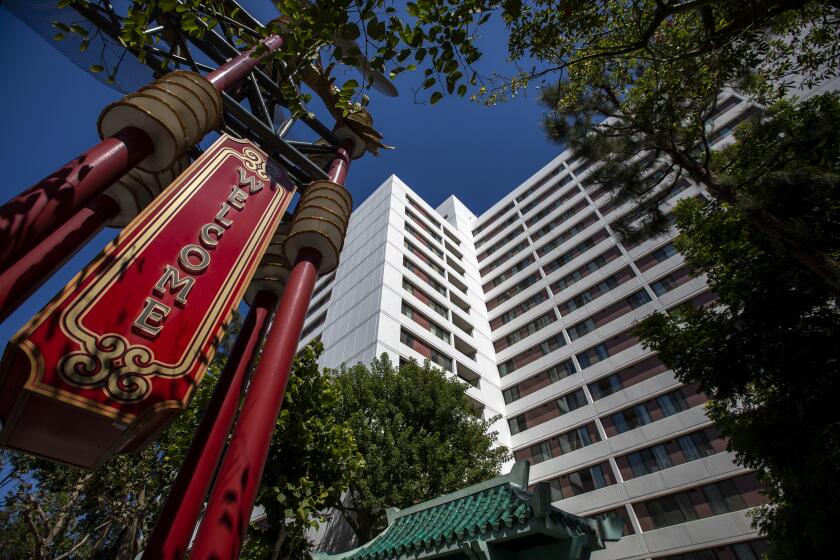California sues former owner of troubled affordable-housing development in Chinatown

- Share via
The state of California is suing the former nonprofit owner of a long-troubled housing development for low-income senior citizens in Chinatown, Atty. Gen. Rob Bonta announced Monday.
The suit alleges that Chinese Committee on Aging Housing Corp. and its chief executive and president Donald Toy, mismanaged operations at Cathay Manor Apartments, a 16-story, 268-unit property, and breached their fiduciary duties by failing to ensure basic health and safety conditions. In recent years, city code and building inspectors have found faulty fire-safety systems and elevators inoperable for months at a time, effectively trapping many elderly and disabled residents inside.
“CCOA Housing Corp. completely failed in their mission,” Bonta said. “It’s wrong. They misused the money. People, seniors, vulnerable populations were hurt.”
Residents and advocates marched Thursday morning about half a mile from Cathay Manor to HUD’s L.A. field office to protest the proposed sale of the building and rent increase.
The suit was filed in Los Angeles County Superior Court on Monday. The state is seeking a judge’s order to dissolve CCOA Housing Corp. and the appointment of a receiver to manage its assets.
An attorney for Toy could not immediately be reached for comment.
Monday’s litigation is the latest in a battery of court actions facing the nonprofit and the building, which was hailed as a haven for aging Chinatown residents when it opened in 1984 as the first federally subsidized low-income development in the neighborhood. But residents’ complaints about conditions have persisted for decades, with protests intensifying in 2021.
That year, 186 residents filed a lawsuit against the owner seeking repairs to the building’s two elevators and laundry facilities, and the city of Los Angeles filed 16 misdemeanor criminal charges against CCOA Housing Corp. and Toy alleging failures to maintain the property. The nonprofit and Toy have denied the civil allegations and criminal charges. Both cases remain pending.
Multiple residents described feeling trapped in the 16-story Cathay Manor building, which has been without working elevators for weeks.
In early 2023, the owner agreed to pay $1.5 million in civil penalties and sell Cathay Manor Apartments following a habitability investigation by the U.S. Department of Housing and Urban Development, according to the state suit filed Monday. A Washington-based nonprofit, House of David Preservation Inc., purchased the building for $97 million in mid-2023. Terms of the deal called for $27 million paid to the owner on the closing date with the remaining $70 million due in June 2025.
The state’s case will ensure proper management of the nonprofit’s funds including the pending payment, Bonta said. The suit alleges that Toy handpicked board members who wouldn’t challenge his decisions and exploited the lack of oversight to transfer money to nonprofits he also controlled. The case alleges that seven years of federal tax forms signed by Toy under penalty of perjury listed a board member of the nonprofit who was deceased.
“We have no faith in the board — Mr. Toy or the other board members — to be able to make payments that are consistent with the mission,” Bonta said.
Besides the appointment of a receiver, the lawsuit seeks the transfer of the proceeds from the sale to another charity and an accounting of all CCOA Housing Corp.’s transactions with Toy, other directors and related entities.
“CCOA and its board members demonstrated a complete and total disregard for the Chinatown community and the seniors who resided at Cathay Manor,” said Los Angeles City Councilmember Eunisses Hernandez, who respresents the area. “They cannot be allowed to benefit from the sale of the building that they so woefully mismanaged and neglected.”
More to Read
Sign up for Essential California
The most important California stories and recommendations in your inbox every morning.
You may occasionally receive promotional content from the Los Angeles Times.










